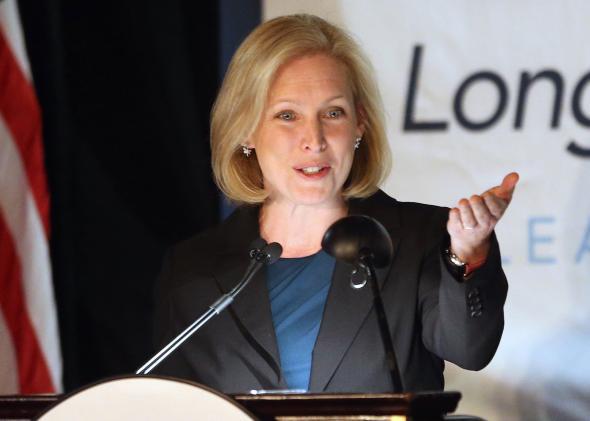In promoting her new memoir Off the Sidelines, New York Sen. Kirsten Gillibrand spoke with People about the way that some of her male colleagues, during her time as a representative and a senator, made comments about her body—some even touching it. People writes:
In Off the Sidelines, Gillibrand, 47, shares a sobering incident in the congressional gym, where an older, male colleague told her, “Good thing you’re working out, because you wouldn’t want to get porky!” On another occasion, she writes, after she dropped 50 lbs. one of her fellow Senate members approached her, squeezed her stomach, and said, “Don’t lose too much weight now. I like my girls chubby!”
The People interview is short, but the New York Post filled it in with some more examples from the book, like the time a congressman told Gillibrand, “You know, Kirsten, you’re even pretty when you’re fat.”
It’s not just boorish politicians. Once, a labor leader decided to give her advice on her appearance.* “When I first met you in 2006, you were beautiful, a breath of fresh air. To win [the special], you need to be beautiful again,” he said.
Sadly, none of this is too surprising to women who work on the Hill, or really to so many working women who’ve discovered that no matter how ambitious or capable they are, some male colleagues will always believe they exist to brighten the room like a nice bouquet of flowers. As many folks on social media pointed out, Gillibrand’s experiences are reminiscent of Marin Cogan’s sobering piece in the New Republic last year, chronicling what it’s like to work as a female reporter, especially if you’re young in Washington: sexualized jokes, endless comments about your body, leering, and come-ons from married men looking for mistresses:
Almost everyone has received the late-night e-mail—“You’re incredible” or “Are you done with me yet?”—that she is not entirely sure how to handle. They’re what another lady political writer refers to as “drunk fumbles” or “the result of lonely and insecure people trying to make themselves feel loved and/or important.”
Sadly, however, we still live in a society where women are supposed to put up with this behavior with a smile, lest they get accused of being humorless prigs or harpies. Even Gillibrand softened her criticisms by making excuses for these guys and assuring us her feelings aren’t hurt. From People:
Gillibrand isn’t especially offended by her coworkers’ remarks. “It was all statements that were being made by men who were well into their 60s, 70s or 80s,” she says. “They had no clue that those are inappropriate things to say to a pregnant woman or a woman who just had a baby or to women in general.”
I’m not so sure. Sometimes this kind of boundary-testing and harassment is done out of malice, a desire to put a woman in her place. And yes, as Gillibrand says, sometimes it’s a matter of ignorance. There are men who are so used to thinking of women as nothing but sex objects that they’re incapable of treating them with the same respect they offer their male colleagues. But it doesn’t really matter if the harasser is a jerk or a fool. This behavior is still unacceptable.
Correction, Aug. 28, 2014: This post originally misstated that a labor leader gave Gillibrand advice on her appearance in 2006. Gillibrand has not specified what year that advice was given.
